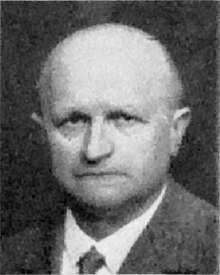Wilhelm Hug
Gustav Wilhelm Hug (born June 2, 1880 in Endingen am Kaiserstuhl , † October 12, 1966 in Tiengen, today Waldshut-Tiengen ) was a German forester and politician ( NSDAP ). From 1933 to 1945, Hug was head of the Baden forest administration as state forest master.
Live and act
After attending elementary school (1886-1891) and the humanistic grammar school (1891-1900), Hug was a member of the 5th Baden Field Artillery Regiment No. 76 for a year. He then studied forest sciences , political science and philosophy in Freiburg im Breisgau , Karlsruhe and Strasbourg as well as at the Technical University of Karlsruhe from 1901 to 1907 and graduated with the state examination. In 1908 he married.
From 1908 Hug Förster was in the Baden state service. After a three-year job as a forest intern, he was appointed forest assessor after the forest state examination in 1911. From August 1914 to the end of 1918 Hug took part in the First World War, in which he was deployed as a field artillery officer on the Western Front .
In 1918 he was promoted to forestry officer and in 1923 finally to forester . In the same year Hug became the service director of the Jestetten Forestry Office . In 1926 he was appointed to the forest council . He was also a member of the citizens' committee of Jestetten and from 1930 of the natural research society.
In October 1930 Hug joined the National Socialist German Workers' Party (NSDAP). On March 18, 1932, he was relieved of his position as Baden Forestry Council because of his work for the NSDAP and was put into temporary retirement. The Sturmabteilung (SA) belonged to Hug 1920-1923 and 1925-1931. From November 1930 Hug worked as an SA training leader and NSDAP local group leader in Jestetten. From 1931 to 1933 Hug was district leader of the NSDAP in Waldshut , where he founded the Schutzstaffel (SS), Hitler Youth (HJ) and the National Socialist Motorist Corps (NSKK).
With the Reichstag election of March 1933 he became a member of the eighth Reichstag of the Weimar Republic , in which he represented constituency 32 (Baden) until his early resignation on June 30 of the same year. Hug's mandate was then taken over by Adalbert Ullmer . During his short term as a member of parliament, Hug voted, among other things, for the Enabling Act of March 1933, which formed the legal basis for the establishment of the Nazi dictatorship.
During the time of National Socialism , Hug, whom the poet Ernst Wiechert, who was also known to him, later described as an "unshakably convinced National Socialist", was state forest master of Baden. On April 1, 1933, Hug was given the management of the forestry department of the Ministry of Finance and Economics in Karlsruhe. Hug thus reached the climax of his forestry career. When Wiechert was arrested in 1938 and sent to a concentration camp, he was finally released again because of Hug's intercession, who was a holder of the Golden Party Badge and knew Heinrich Himmler personally. Hug headed the Baden regional group of the German Forestry Association from 1933 until the end of the war and was the acting Baden regional hunter master from 1934 to 1945.
Hug ran unsuccessfully for the election of the " Greater German Reichstag on April 10, 1938". In 1939 Hug Gau was head of the main office and NSDAP district leader z. b. V.
After the end of the Second World War , Hug was dismissed from the civil service and denazified in 1949 as a “minor” .
Fonts
- The forestry conditions in Baden , 1936.
literature
- Karl Hasel : Wilhelm Hug . In Peter Weidenbach (Red.): Biography of important forest people from Baden-Württemberg . Publication series of the state forest administration Baden-Württemberg, Volume 55. Published by the Ministry for Food, Agriculture and Environment Baden-Württemberg. Landesforstverwaltung Baden-Württemberg and Baden-Württemberg Forestry Experimental and Research Institute, Stuttgart and Freiburg im Breisgau 1980, pp. 262–265
- Karl Hasel: Hug, Gustav Wilhelm . In: Baden-Württembergische Biographien , Volume 2. Published by Bernd Ottnad on behalf of the Commission for Historical Regional Studies in Baden-Württemberg. W. Kohlhammer Verlag, Stuttgart 1999, XXI, 538 pp., ISBN 3-17-014117-1 , pp. 233-234
Web links
- Literature by and about Wilhelm Hug in the catalog of the German National Library
- Wilhelm Hug in the database of members of the Reichstag
- BIORAB database - entry Wilhelm Hug
Individual evidence
- ↑ Martin Döring: "Parliamentary Arm of the Movement" , 2001, p. 374.
- ↑ Ernst Emil Wiechert: Years and Times. Memories , 1948, p. 337.
- ↑ Manfred Franke: Jenseits der Wälder , 2003, p. 79.
- ↑ Erich Stockhorst : 5000 heads. Who was what in the 3rd Reich . 2nd Edition. Arndt, Kiel 2000, ISBN 3-88741-116-1 , p. 211.
| personal data | |
|---|---|
| SURNAME | Hug, Wilhelm |
| ALTERNATIVE NAMES | Hug, Gustav Wilhelm (full name) |
| BRIEF DESCRIPTION | German politician (NSDAP), MdR |
| DATE OF BIRTH | June 2, 1880 |
| PLACE OF BIRTH | Endingen am Kaiserstuhl |
| DATE OF DEATH | October 12, 1966 |
| Place of death | Tiengen |
